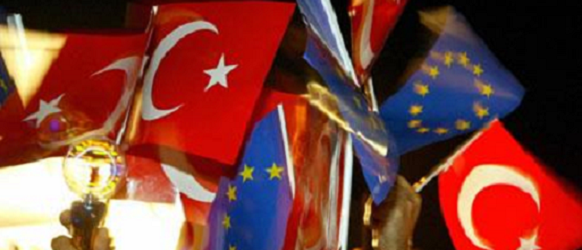12th September 2013 marks the 50th anniversary of the Ankara Agreement, signed in 1963 in Ankara, hence its name. The agreement established an association between Turkey and the then European Economic Community (EEC) signaling the start of a long-standing close relationship. The Ankara Agreement provided the basis for deepening the economic, political and institutional relations between Turkey and the Community. It was part of a broader political project in which Turkey was offered the prospect of full accession, as clearly stated in its Article 28[1] of the Agreement.
Ankara Agreement
It is important to note that at the signing ceremony in Ankara, the then Commission President Walter Hallstein explicitly recognized that “Turkey is a part of Europe”. However, Turkey’s Europeanness has been constantly under debate ever since by certain European leaders who have raised doubts about the appropriateness of admitting Turkey to the EU. They believe Turkey does not belong to Europe neither historically, nor culturally or geographically.
Turkey applied for full membership on 14 April 1987. Only after waiting 18 years, the European Council decided to start accession negotiations with Turkey on 3 October 2005. Besides the fragile political situation at home, another reason for the deferral of the decision to consider Turkey’s application was the rapid internal changes that the EU was undergoing during those years. The then European Community (EC) was in the process of becoming an even tighter economic and political union, particularly after the entry into force of the Treaty of Maastricht on 1 November 1993 which formally established the EU as we know it today and led to the creation of the single European currency, the euro. Following the collapse of the Soviet Union in 1989, the decision on Turkish membership was further delayed as the EC felt the moral duty of bringing the former communists countries back into the European family, postponing the recognition of Turkey as an eligible candidate until 1999.
After the enlargement waves of 2004 and 2007 (in which 10 new countries joined the EU), some voices argued that it would take time to digest the newcomers before even thinking to make the EU a bigger family. The effects of the economic crisis have notably exacerbated enlargement fatigue. For the time being, enlargement is no longer in the EU’s list of priorities. Moreover, the costs of Turkey’s accession to the EU have been estimated to be high. Turkey’s detractors emphasize that bringing Turkey on board would be very costly given its large and relatively lower income population (being therefore entitled to benefit from EU funding in order to catch-up with the other EU countries). For that reason, the EU has foreseen specific arrangements for areas such as freedom of persons, structural policies or agriculture in order to calm down the most vociferous opponents of Turkey’s EU membership.[2]
The 2004 enlargement round brought a new obstacle to Turkey’s EU path. As Cyprus became a member of the EU, the so-called “Cyprus issue” also became an internal problem of the EU. Ever since Cyprus entered the EU, Greek Cypriots have used its privileged position to undermine Turkey’s aspirations of ever becoming an EU member.[3] Before they joined, Greece served that purpose by blocking the final implementation of the Customs Union asking the EU to include Cyprus in the next phase of enlargement.
One of the main achievements of the Association Agreement has certainly been the establishment of a Customs Union, envisaged at the end of the transitional stage of the Ankara Agreement, which entered into force on 1 January 1996. The Customs Union represents the deepest economic and trade relationship that the EU has ever had with any third country. Nonetheless, the agreement is asymmetric in nature as it was to be revised after Turkey would have entered the EU. However, this is still a distant goal today. Due to this fact, Turkey finds itself in a disadvantaged position and therefore asks to address these imbalances. The EU-U.S. free trade agreement being negotiated at the moment is a good example. Turkey’s priorities risk of not being taken into account in this deal, having to look for its own trade initiatives with the US.
Nonetheless, the Customs Union has had an undeniable impact on the Turkish economy. The EU is the most important trade partner of Turkey, and Turkey is the seventh biggest trade partner of the EU. Today more than half of Turkey’s trade is with the EU.
Turkey and Europe: the way ahead
Fifty years ago, no one could have ever imagined that this journey would last so long. Turkey has become the longest standing applicant to the European Union.
Turkey’s bid for EU membership has gone through many ups and downs. 2013 was a year in which renewed momentum was expected to be injected into the accession negotiations, as some positive developments were underway. However, the outbreak of massive anti-government protests across Turkey last June, which seem far from having ended, and particularly the way in which the AKP has handled those protests have greatly polarized the Turkish society fueling distrust on the EU side whether Turkey is still committed to make reforms in line with EU standards.
Accession talks have been put on hold since then. Despite major reservations from Germany, the opening of chapter 22 on regional policy -blocked until very recently by France- was finally opened as planned but talks were postponed until the release of the Commission’s progress report in mid-October, which is not expected to appear condescending with the internal political affairs in Turkey.
It seems unlikely to see any move in EU-Turkey relations until the results of the German elections, to be held on the 22nd of September, and the EU institutions evaluate Turkey’s current situation.
The Turkish government on the other hand seems more preoccupied with the crisis situation in neighboring Syria while preparing the ground for the upcoming local and presidential elections to take place in March and September 2014 respectively.
2014 will also be crucial for the EU, as European elections are expected to take place between 22-25 May. The direction that the EU will take in the coming years will be decisive for Turkey’s place in Europe. Regardless of Europe’s fate, Turkey has to show its real commitment to reform proving that EU membership remains its long-term national goal and revive the reform spirit of the early years of the AKP government making sure Turkey doesn’t wait for fifty more years.
Laura BATALLA
[2] European Council Conclusions, Brussels, 16-17 December 2004, http://www.consilium.europa.eu/ueDocs/cms_Data/docs/pressData/en/ec/83201.pdf
[3] On this issue you can read the latest interview to Hugh Pope, Turkey/Cyprus project director at the International Crisis Group, to Hürriyet Daily News, http://www.hurriyetdailynews.com/europeans-punishing-greek-cyprus-for-abusing-eu-perks.aspx?pageID=238&nID=54065&NewsCatID=351

























































